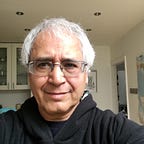STAGE 3: TEASER EXTRACT — 3
Communing with Higher Powers?
……..The culture of mathematics education was heavily influenced by the behaviors of early practitioners of mathematics who were perceived by the public as possessing a kind of “mystique” associated with knowledge that few could understand. In the eyes of their citizenry, they had mysterious powers, the secret knowledge that could transform clay, trees and stones, into pillars and columns, obelisks and domes and megalith constructions like the pyramids. These inspired awe and wonderment, even fear, among those who looked on. Ordinary citizens would wonder where their “magic” came from? Whether these mathematicians communed with higher beings who had the power of life and death over them? Well, in a sense they did, because these mathematics-savvy thinkers and planners had the knowledge to tell builders and craftsmen what to build and how to build them according to strict specifications in order to perform their miracles.
So they walked with their heads held high, in the corridors of imperial power. Their ingenuity had come to the attention of emperors and kings and powerful priests since the BC era. Monarchs and princes sought their services and rewarded them amply for forging a productive allegiance. They were employed to oversee imperial accounts, develop war-machines, build ships and bridges, even tutor their children. Furthermore, the other-worldly side of monarchs sought posterity. They aspired to see magnificent, imposing creations that stood for the size of their imperial egos. When their subjects passed by massive gates one storey high, they would feel small and submissive and bow to their power over life and death.
The Knowledge-is-Power Complex
It was a behavior that encouraged emperors and priests..and all close to them, including mathematicians… to be perceived as superior and indeed, supreme beings whose existence has been grafted upon their land by divinity itself. The saying that “knowledge brings power” may be closely related to the kinship that develops between powerful rulers and those who possess the knowledge to turn their dreams, visions and fantasies into spectacular realities, sturdy enough to claim immortality. So far, a cursory glance of history appears to indicate how a combination of the following three elements contributed mainly to the conundrum of Missing Links:
(i) resource-based limitations e.g. inability or unwillingness to explain due to the paucity of language and vocabulary, physical limitations of printing text-books
(ii) a heavy emphasis upon learning mathematics as a set of rules and procedures prescribed by mathematicians for exclusive use in practical applications.
iii) the preponderance of “knowledge-brings-power” complex that defends the mystification of mathematics-learning with the use of highly verbose language.
Many, quite rightly prescribe switching from rote-driven recording of procedures to self-ownership when recording them. Others emphasize the ubiquitous presence of mathematics in every day life and its application in developing new technology, etc. The world’s cities, with all their amenities (or lack of them) and technological applications, are a homage to the mathematical algorithms humming silently inside them, all around us. Mathematics is moulding unique styles and features of everything from smart phones to elementary particle accelerators.
Unfolding the Laws of Human Intelligence
Paradoxically, however, the more learners are coerced to think of how mathematics shapes the the world around them, the more overawed and anxious they feel. It must take some superhuman struggle (!), they think, to attain the level of math proficiency needed to function at such superior levels of achievements, “when we are still struggling with long division and fractions!” Mathematics, when presented this way to a population of learners who are intimidated by its conventional depiction… feels quite impossible to do. To succeed in math means to qualify for the math Olympiad or fail trying. They would rather not try.
In the words of Charles Boyer, the famous English mathematician, James Joseph Sylvester (1814–1897) “…regarded the objective of pure mathematics as “unfolding the laws of human intelligence much as physics discloses the laws of the world of the physical senses”. There is profound intelligence hidden in abstract mathematical truths that lie beyond the boundaries of our sensory experiences. To “unfold the laws” of pure physics, educators take great pains to explain and demonstrate them to school-going students by using analogies, experimental explorations and detailed visualization of underlying concepts………by the same token, “unfolding the laws of human intelligence” in the domain of mathematics, would require a similar pedagogical approach……(cont’d……)
Teaser Extract -3 from: “From Math Anxiety to Mastery in 6 Stages”- Stage 3: Processing Numbers
Copyright © Shad Moarif, July 2023, ALL RIGHTS RESERVED
